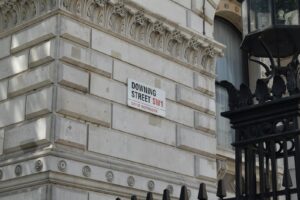15 minutes with… Adam Lent, director of NLGN
 The New Local Government Network this week published its ‘changemaking’ vision for local government. New Start talks to its director Adam Lent about technocratic meddling versus transformative, value-led change.
The New Local Government Network this week published its ‘changemaking’ vision for local government. New Start talks to its director Adam Lent about technocratic meddling versus transformative, value-led change.
On the three core values needed to transform local government: The re-invention of local government in an incremental way has reached its limit and now we need a total rethink of how the public sector and local government work. There are three key issues that come up in conversations with local government. Firstly, the need for collaboration across the public sector and within councils. Then there is the need for creativity to be embedded within the culture of organisations, allowing agile responses across the board. Thirdly, and strongly connected to creativity, is the need for self-determination, giving staff the authority to innovate and achieve the mission of local government and of place. Councils need to be the leaders of cultural change in their communities. In previous jobs I’ve looked at organisational change in the private and social sectors and the most thoughtful and impactful leaders are those that focus on culture and values.
On innovative councils: Councils are the most innovative part of the public sector now and I’ve been impressed by their openness and innovation, which they have had to do because of the pressures they have faced. Most councils are on a journey and are beginning to understand and apply this approach. Essex council is one that has many challenges but which is shifting its culture and thinking radically about how to change. Greater Manchester stands out for its collaborative approach. And in Staffordshire, the council, rather than setting up committees and complex structures to deal with issues, is inviting key local leaders to sit down and brainstorm and develop a vision of their place. The university, the police and health services are all getting involved in those conversations. It’s no longer about the council being in charge but about a group of people working together, and creating a collaborative mindset that puts self-interest aside for the greater good.
On how council leaders need to be more like General McChrystal, head of special forces in Iraq in 2003: McChrystal was literally in a life and death situation but he managed to transform the culture of his troops on the front line, by breaking down the classic hierarchical structure, and giving them permission to be creative and act on their own initiative. Councils have a lot of pressures to contend with, but it is precisely because of those pressures that they need to transform their culture and be able to react more quickly. We call it ‘double-running’ – the idea that a big transformational agenda can happen alongside delivering services and dealing with pressures. We want to give councils the tools and techniques to enable them to do that.
On metro mayors: I’m ambivalent about metro mayors. Do new mayors and another restructure of local government provide the answer? If mayors are soft power leaders who use their role to inspire and enable a co-produced vision of place, then they will be a force for good. But if mayors see themselves as the person in charge, and use that platform for their own political ambitions, that will be detrimental to places.
On devolution and Brexit: Devolution needs to be about identity and place and giving people a real say, rather than a technocratic vision of functional economic geographies. Mayors can make that happen. Brexit is also becoming a highly technocratic process rather than a response to a cry for help. The Brexit vote was about a sense of identity and a lot of that was not positive but leaders need to grab that allegiance to place and get people involved in real debates about jobs and skills where they live. When you get people involved in the deliberation of an issue and give them the facts they come up with solutions. None of that is coming through in this debate. Mayors can make that happen and offer a genuine, meaningful response to the Brexit vote.
On working with communities: Councils have to get far better at it. There are always legal and financial reasons not to allow a community to do something and councils often put barriers in the way. There is an important role for local councillors to be change-making agents, with visions for their ward, who act as conduits for those people wanting to create local change. There are important questions to ask about the skillsets of councillors and the techniques they can use to shift culture.
On the three possible futures for local government: A lot of councils have been muddling through since 2010, salami-slicing and doing more for less. This approach is not sustainable. The second route has been what we call ‘doubling down’, moving towards commercialisation and new sources of revenue and demand management. In five years we will see some councils that have really made a success of this and are driving local growth. The third approach comes from change-making councils with a clear sense of mission, who are real drivers of social change. They stand in contrast to the inertia, hierarchy and territorialism of some local authorities. They are very different radically as organisations, a lot flatter and more creative. These councils will be inspirational places to work.
On economic development: A key issue that gets overlooked is the culture and mindset of a community. When we talk about economic development we tend to look at hard infrastructure, rather than how councils can be the leaders of cultural change in their localities. Places that do well in terms of economic growth are those that have the right mindset, the willingness to innovate and work with other partners to generate change. Stockport council is doing this really well.
On his book ‘Small is Powerful’: There’s an enormous battle under way between the centralised, authoritarian and the ‘big’, and the distributive, democratic, free choice and ‘small’. To me Brexit is a victory to big power, not small. History shows that there is no inevitability to where these different visions end up. We all need to join the fight.
- A Changemaking Vision for Local Government is available here.















